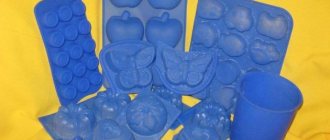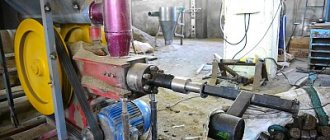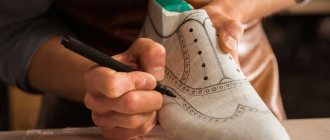* The calculations use average data for Russia
10,000 ₽ Starting investment
60,000 ₽ Revenue
30,000 - 40,000 ₽ Net profit
100 kg/month Productivity 1 person
Handmade soap. Start your own business producing handmade soap. To start soap making you need a minimum of skills and an investment of 10 thousand rubles. This is an ideal option for those who want to make money from creativity.
Making homemade handmade soap is a suitable option for a home business. If you want to start your own business, but are still new to entrepreneurship, then this idea will come in handy. The production of handmade soap does not require specific knowledge or large investments; anyone can master the technology of soap making. You will not need to purchase complex equipment, but your creativity and developed imagination will definitely come in handy. The popularity of handmade soap is due to the exclusivity and naturalness of the ingredients. So everything is based on your ability to make not an ordinary bar of soap, but an original product that the buyer will like.
The experience of other entrepreneurs shows that the business idea of handmade soap can be realized with a budget of 10 thousand rubles. This money is enough to make the first batch of goods and launch advertising. You will be able to recoup your investment in a few months. The markup on goods in soap making is 150-300%, depending on the type. This ensures high profitability of 50%. But such an indicator can be achieved with proper organization, established sales and creative individuality.
Relevance of business ideas for handmade soap production
In Russia, the market for natural homemade handmade soap is not saturated. People are accustomed to using regular soap from store shelves. Why do domestic soap makers experience sales difficulties?
- Homemade soap is more expensive than factory soap: the cost is added by the natural ingredients in the composition and the fact that it is handmade.
- Even if it is possible to spend 200 rubles on a piece of handmade soap, a person will not bother himself with online orders and searches. He will most likely try to simplify the purchasing process as much as possible: he will go to the store. It is very rare to find homemade soap from private domestic craftsmen on the shelves. Most often these are imported products.
Two Main Problems You'll Have to Overcome When Making Handmade Soap:
produce high-quality goods for which they will be willing to pay, and find the most convenient sales scheme for the buyer.
Despite the challenges of producing handmade soap, the handmade soap market is growing at approximately 20% annually. There are several reasons for this. The popularization of environmentally friendly products has increased the demand for natural homemade soap. Figured soap in original packaging began to be sold as souvenirs and gifts. The development of the cosmetics market has increased the popularity of care soaps: hypoallergenic, cleansing and even medicinal products have appeared. And of course, fashion for handmade things also plays a role.
Therefore, homemade handmade soap is a current trend that is in demand. Your task, as an entrepreneur, is to create an attractive offer on the market.
Permits and documents
To produce handmade soap, it is enough to register as an individual entrepreneur.
Let's consider the complete list of necessary documents for the production of handmade soap with the rental of a sales shelf in a specialized store in St. Petersburg.
- Documents confirming registration of business activities: certificate of registration of individual entrepreneurs, extract from the Unified State Register of Individual Entrepreneurs
- Sublease agreement
- Employment contracts with employees
- Documents for a cash register
- Agreements with suppliers
- Conclusions of the SES (Rospotrebnadzor)
- Declaration of conformity in accordance with technical regulation 009/2011 “On the safety of perfumery and cosmetic products.”
- Voluntary certificate of conformity to GOST R (in the case of trade in handmade soap for household use in Russia).
How to start a handmade soap business
Any business starts with a clearly defined idea. Before developing a business plan and purchasing equipment, you must generate a business idea and analyze it. “Making homemade handmade soap” is only half the idea. For successful entrepreneurial activity, you first need to think about the concept.
Compare two business ideas:
“Produce homemade handmade soap”
“Open an online store of hypoallergenic handmade soap made from goat’s milk.”
In the first case, there is simply an idea to start a business and a niche chosen for this. In the second case, there is a concept, a unique offer aimed at the target audience, and an understanding of how the product will be sold. In this case, the model is logical: such homemade soap is most often bought by mothers whose children suffer from allergies. To purchase such a product, mothers are willing to order it through an online store and pay more than for a bar of regular soap.
One of the most common mistakes in handmade soap production is lack of concept. The assortment is formed by chance: we saw the design of the soap, bought the ingredients, made it... This scheme is suitable for a hobby, but not for business. It is important to decide: you sell what you produce, or you produce what sells. The secret to a successful soap making business is the second option. This is why it is important to choose a concept at the start. An article where we have collected 17 original ideas in soap making will help you decide. Try to analyze each idea and evaluate whether you can sell it.
Once you have clearly formulated the concept of your business, you can move on to active steps in making homemade soap.
Equipment and materials for the production of handmade soap
Finding ingredients and equipment to make handmade soap is not a problem. Soap making is a fairly popular type of handicraft, and there are many specialized stores on the Internet where you can buy everything you need.
To make soap you will need the following ingredients:
- Soap base
is something without which it is impossible to make homemade soap. Consists of fatty acids and glycerol. Usually sold by weight. - Carrier oils
are added to soap so that it does not dry out the skin or cause irritation. Base oils: olive, coconut, jojoba. There are other types - their use depends on the type of homemade soap you plan to make. - Esters
are used for flavor. You can buy them at pharmacies or craft stores. - Dyes
help create bright and unusual soaps. It is better to choose natural dyes: you can use decoctions of herbs and flowers, dry plant extracts, various spices, cosmetic clays, etc. Cosmetic clay is most often used. - Fillers
can be soft gommage components, scrubbing additives (ground coffee, raspberry seeds, apricot kernels, etc.), as well as dried flowers, such as lavender, and other additives. - Fragrances
are helpers for essential oils. Fragrances allow you to make the aroma of soap more intense. The assortment on the handicraft market allows you to purchase flavors with different scents. - Shapes
– in soap making, both classic, rectangular, and curly shapes are used. - A scale
is needed to mark the weight of the finished bar of homemade soap. After all, the price of the product depends precisely on this parameter. Do not buy mechanical scales under any circumstances, as they have too large an error. - The containers
will come in handy during the soap making process. Pans without enamel (preferably stainless steel), forms for a water bath, as well as small tools such as knives and graters for soap base, pipettes, spatulas, measuring cups, etc.
Handmade soap production technology
We will not go into detail about the entire process of making handmade soap. To learn how to make soap, you can use specialized literature, sign up for a master class, or learn everything yourself using videos on Youtube. We will only focus on the key stages that are important from the point of view of doing business.
In the process of making handmade soap, the soapmaker does the following:
- melt the base using a microwave or water bath;
- adds fillers and oils to the heated liquid base;
- the liquid base is poured into a mold where the soap hardens;
- packages finished products.
Before purchasing ingredients for handmade soap, think about what recipes you will use to make soap. This way you will avoid unnecessary and spontaneous purchases.
When you prepare the liquid base for homemade soap, record the consumption of each ingredient. This will allow you to calculate the cost of handmade soap, which will be useful when setting prices and purchasing ingredients.
Pay special attention to packaging. Handmade soap is often purchased as a gift, and therefore product design is very important. It performs not only a decorative function, but also emphasizes the uniqueness of the product itself. For example, natural soap is packaged in craft packaging to support the theme of environmental friendliness. But shaped soap in the shape of flowers will require a completely different packaging. By the way, packaging costs should also be taken into account in the cost price.
Why soap production is a profitable business
Mini-businesses producing homemade soap are popular among entrepreneurs. Its important advantage is a relatively small initial financial investment, high profitability and quick payback. Buyers consider handmade soap to be more natural and healthier , and often purchase it as a gift as a beautiful souvenir.
The demand for this product continues to grow. According to experts, the Russian soap-making market is covered by less than half - that is, new manufacturers have every chance to occupy their niche without high competition.
Calculation of the cost of handmade soap
In order to calculate the cost of homemade soap, you need to know:
- How many ingredients does it take to produce 1 kg of homemade soap, i.e. include the cost of materials in the cost price;
- Packaging cost;
- Product marketing expenses. If you sell through an online store, you will bear the postage costs; if you hand over the goods for sale to a store - transportation costs;
- The coefficient by which manual work is assessed. For example, a standard rectangular soap is easier to make than a shaped one. Accordingly, the master’s work will cost differently;
- Other expenses, which include advertising, utilities, and unforeseen expenses. You won’t be able to calculate them down to the penny, but it’s worth keeping them in mind.
To simplify the process of calculating the cost of handmade soap: when making homemade soap, the amount of overhead costs is approximately 20 percent of the cost of raw materials. On average, the cost of 1 kg of handmade soap is 300-500 rubles. And the selling price will be 1000-1200 rubles.
When setting the price, be sure to rely on market averages. Study the price tags for similar products in ten different places - you will find the average value.
Income from handmade soap production
The answer to this question depends on several factors:
- Where do you produce Handmade soap
. Renting a space significantly increases the cost, so most people start with home production.
- How much handmade soap
do you produce?
It depends on what volumes you purchase raw materials. Wholesale purchases (which can be done jointly with other soap makers) are much cheaper. - How much does the sale cost?
We previously found out that the sales process itself costs money. Trading in your store – costs of rent and salary to the seller; trading through a website is the cost of its creation and hosting.
- How many people are involved in the production of handmade soap?
.
- Amounts of additional expenses
, which we mentioned when calculating the cost.
- Maximum performance.
You cannot sell more soap than you can produce. When you work alone, and even at home, production volumes are limited. In such conditions, you will be able to produce goods worth 50-70 thousand rubles per month.
- How much handmade soap
do you sell?
It is clear that we need to strive for 100% sales of products. But in reality, it is not always possible to sell everything that you have made. Remaining products can be sold as part of promotions or used as a bonus when purchasing for a certain amount. - What else do you sell?
Related products can work wonders and double your revenue. They are used to support impulse or passive demand. For example, a person came to your website to buy homemade soap, but saw essential oils, bath and cosmetic items on sale, and bought some of these. In addition, there are so-called “profit generators” - goods with a high markup. One such product in your area is bath balls (bombs). Their wholesale cost is a maximum of 15 rubles, and they sell them for 200-300 rubles.
Now let's move on to specific numbers. As experience shows, you can earn on average 30 thousand rubles a month from soap making, so few people call soap making the word “business”. This is the level of net profit that is achieved with a turnover (revenue) of 50-55 thousand rubles.
Costs and profits
Soap is a shelf-stable product - if a batch is damaged or out of date, make a new one from the same raw materials.
To start a soap production from scratch you will need about 120,000 rubles. Payback is about 3-4 months with an average monthly profit of 35,000 rubles. Profit depends on the quality of products, the relevance of forms and compositions, and proper advertising.
Let's look at approximate costs:
Initial costs:
| Expense item | Amount, ₽ |
| Website with custom design | 35 000 ₽ |
| Paperwork | 3 000 |
| Raw material | 30 000 |
| Utensils and auxiliary tools | 25 000 |
| Total | 123 000 |
Current expenses per month:
| Expense item | Amount, ₽ |
| Purchase of raw materials | 50 000 ₽ |
| Purchase of auxiliary materials | 10 000 |
| 10 000 | |
| Rent a shelf in a store | 2 000 |
| Total | 72 000 |
Sales of handmade soap
Properly organizing the sale of handmade soap is no less important than learning how to produce it. And the biggest problem for needlewomen is often the sale of products.
You can go two ways: create your own handmade soap store or sell the goods to others (various gift shops, perfume and cosmetics stores). You can also rent a shelf in a store for your products - this will cost less than opening a new outlet yourself (about 3,000 rubles).
If you want to sell handmade soap online, create pages on social networks (“Instagram”, “Vkontakte”), create accounts on specialized sites, for example, “Masters Fair” or foreign Etsy.
To promote your handmade soap, send a commercial proposal to retailers with whom you would like to cooperate, actively promote products through social networks, organizing sweepstakes and promotions, and participate in various fairs in the city. Experiment with design, shapes, colors. Update your assortment to constantly maintain demand for your products.
If you follow these recommendations, you will definitely find your buyer.
Here are some tips to help you advertise your products:
- Launch a loyalty program for regular customers, for example, discount cards with increasing discounts depending on the amount of purchases;
- Enter the sale of gift sets - they can be sold at a higher price;
- Delight your customers with mini-presents, for example, attach a gift card or a note with wishes to the purchase;
- Distribute flyers and business cards in gift shops, cosmetics stores, etc.;
- Come up with your own feature that will distinguish you from other soap makers. These are offers from the category “Only with us...”.
How to make soap at home in 5 steps
1. Melt the soap base. Prepare all the necessary ingredients and tools so that you have them at hand at the right time. Cut the soap base into small pieces, place in a container and place in a large saucepan in a water bath. Wait until the base is completely dissolved, while making sure that its temperature does not exceed 60 degrees. When boiling, bubbles form in the mass, which will spoil the appearance of the soap, especially transparent ones.
2. Add base oil. If you are using a ready-made base or baby soap, add base oil at the rate of one tablespoon per 100 g of soap. If you are making soap from scratch, follow the recipes. You can add one oil or several at once. With palm oil, the soap turns out to be as hard as possible, castor oil gives excellent foam, and coconut oil is responsible for the quality of cleansing. Olive oil is suitable for creating baby and hypoallergenic soap. Avoid sunflower, flaxseed and corn oils - they quickly go rancid and the soap spoils.
3. Add dye. For soap making from the base, professionals recommend choosing food colorings that do not cloud the mass and do not precipitate. 5 drops per 100 g of base is enough to give the soap a bright, rich color. When making natural soap from scratch, it is better to use mineral pigments: for example, titanium dioxide for whitening, chromium oxide for green, iron oxide for red.
4. Add essential oil. The concentration of essential oil in soap base is usually 1-4%. In made-from-scratch soap, the oil content varies depending on its volatility. Heavy oil - cedar, neroli, cinnamon - up to 1%. Light oil - orange, tea tree, eucalyptus - up to 10%.
5. Give the desired shape. Spray the selected mold with alcohol from a spray bottle. Carefully fill it with liquid soap and place it in a cool place for a couple of hours or in the refrigerator for five minutes. The packaging of the soap base usually indicates the hardening time. After the soap has hardened, dip the mold into hot water and remove it. Place on paper and leave to dry for two days.
Is it necessary to register a business producing handmade soap?
An important question asked by everyone who makes handmade soap. The answer depends on what format of work you choose. Provided that soap making is an additional income and the sales volumes are not very large, it is not necessary to register your business. The lack of legal registration will not harm sales, since many small souvenir shops willingly buy handmade goods, and when selling independently on the Internet, no documents are required. In this case, the legal issue boils down to filing a tax return once a year.
If your plans are to develop your business, it is recommended to register an individual entrepreneur. For this purpose, the activity code according to OKVED-2 “32.99 Production of other finished products not included in other groups” is suitable. In addition, to open a point of sale you will need a trade permit and other documents that require time, money and your nerves. After registering as an individual entrepreneur, you must open a bank account and set up a payment system. This is especially true for those who are planning to sell online. You must have accounts with Sberbank, Yandex.Money and Webmoney - the most common payment systems.
Difficulties in the soap making business
Soap making is characterized by the same difficulties as most types of needlework.
- Sales channels
. The most important thing in a home business is to find buyers and achieve regular sales. A unique offer that will be of interest to consumers and wholesale buyers can help with this. You will have to support regular sales with active advertising. - Soap making skills.
Technology, imagination, and quality of execution are important here. All this affects whether your products will be in demand. - Competition
. In addition to other needlewomen, there is competition from large manufacturers. There are no more than 20 of them on the market, but they set the direction for the entire market. It is often pointless to compete with them on price. You can only hope for the originality of your idea and the “handmade” tag, which can attract connoisseurs. Always think about why a buyer should choose your product over a more affordable and popular product. If you can’t answer this question for yourself, then the buyer, even less so. - Risk of order cancellation or payment problems
. Therefore, you can work on prepayment. But the problems don't end with shipping the goods. The package may be damaged during transportation or even lost. To prevent this risk, you need to pack your homemade soap well, send parcels with a declared value, or enter into an agreement with a transport company that will deliver the parcels safe and sound in the shortest possible time. - Perform all functions
. With small volumes, you will cope alone: you did it yourself, you sold it yourself. This is the mistake of many soap makers - doing everything themselves. But it is better to delegate the manufacturer’s function to someone and deal only with organizational work: purchasing raw materials, negotiating cooperation with wholesale buyers, and conducting retail sales. It is advisable to do this when the business stabilizes and begins to generate good income. - SES certificate
. You may have problems with the SES without a special certificate. The difficulty is that to obtain a quality certificate you need to submit your products to a laboratory and pay money for it.
How to advertise and sell your products
Despite the low competition in the soap industry so far, when entering the market, an entrepreneur needs to widely inform potential buyers about his products . This can be done through the publication and distribution of special catalogs and leaflets.
Internet advertising is of great importance. It is necessary to create and regularly maintain groups on social networks (Vkontakte and Instagram are best for sales). Take high-quality photographs of your product and publish beautiful pictures daily with small captions that motivate you to purchase your product. For many buyers, it is important to know as much information as possible about the products they purchase - tell us how you make soap, why you add certain ingredients, why they are useful, and so on. This will make your page interesting and memorable.
If production begins to generate good profits, you should think about creating your own website and online store . You will have to pay about 10 thousand rubles for its development, and then regularly support it, fill it with content and update it. However, these costs will pay for themselves.
Checklist for starting a homemade soap business
Tips for Beginner Soap Makers
- Starting investments - about 10 thousand rubles;
- The maximum productivity of one person is 100 kg of soap per month;
- Revenue (for the sale of 300 pieces of soap at an average price of 200 rubles/piece) - 60 thousand rubles;
- Net profit (with costs of producing 300 pieces of soap 17 thousand rubles) – 43 thousand rubles;
- Main buyers: individuals, souvenir shops, cosmetics stores;
- Main promotion channels: Instagram, VKontakte, Crafts Fair, Etsy, city fairs;
- sales launch time: on the eve of the holidays (New Year, March 8, etc.);
- high sales season: autumn-winter period.










